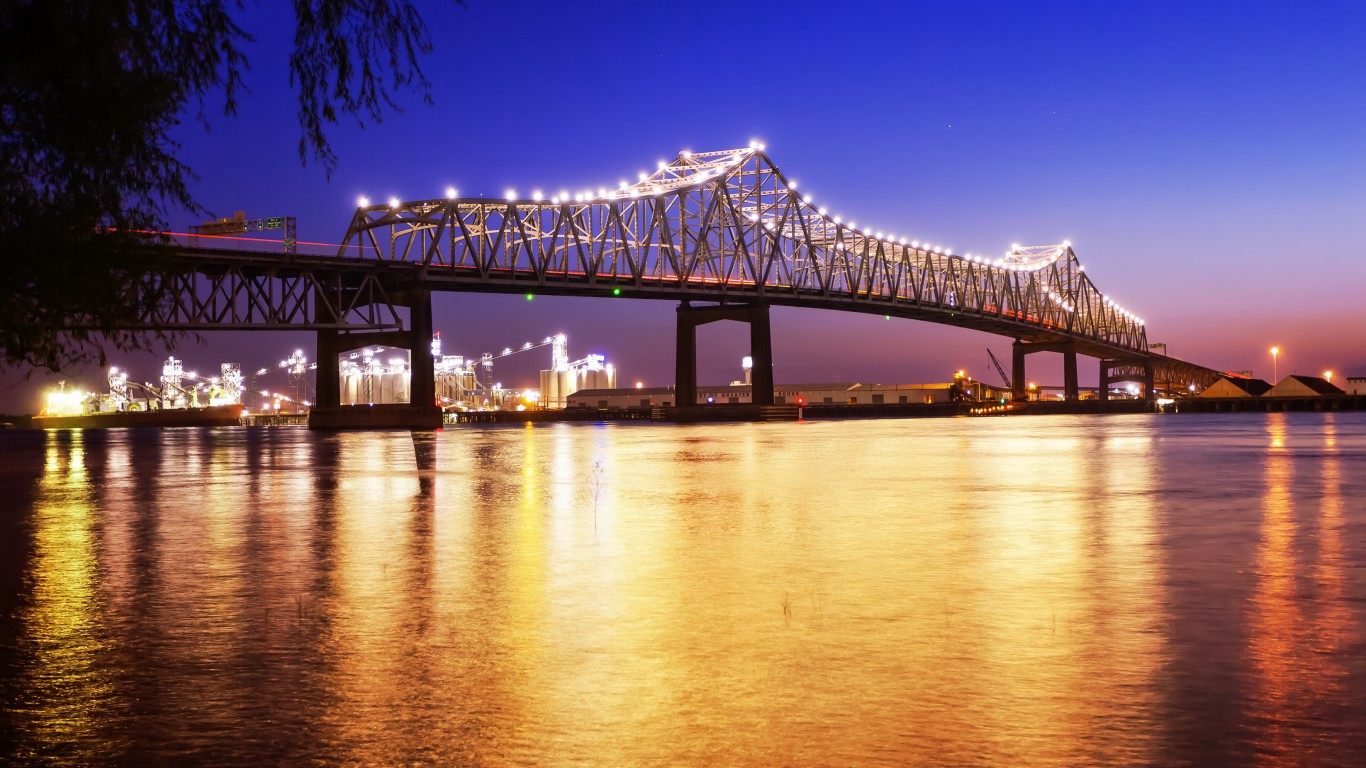
The COVID-19 pandemic sent economic shockwaves through the U.S. economy, tripling the monthly unemployment to nearly 15% and leading to a more than 30% quarterly decline in gross domestic product, by far the largest economic contraction in U.S. history.
No corner of the country was untouched by the pandemic’s economic consequences, but some states have emerged better off than others. A range of factors, including industrial diversity, labor force education levels, household income and long-term GDP growth have an effect on a state’s overall economic strength and its ability to withstand the impact of the pandemic.
To determine the states with the worst economy, both in the years leading up to the pandemic and during it, 24/7 Wall St. created an index of five measures: five-year economic growth, five-year employment growth, the poverty rate, unemployment rate and share of adults with a bachelor’s degree or higher.
Many of the states with economies that rank on the lower end among all 50 depend on industries that were hit hard by the COVID-19 pandemic. States like Hawaii and Nevada, where tourism is an economic pillar, as well as states like Wyoming and Alaska, which depend on resource extraction, have been hurt badly.
GDP growth, one of the index components, is commonly used to gauge the relative economic vitality of a given geographic area. Economic growth is often fueled by population growth, and many of the states with the fastest-growing economies (indeed, many of the states with the best economies) also have rapidly growing populations. Americans are relocating to many of the higher-ranked states on this list, and these same states also often have far higher than average birth rates.
In determining the state with the worst economy, the average annual GDP growth rate from fourth-quarter 2015 to fourth-quarter 2020 came from the Bureau of Economic Analysis (BEA) and was included in the index at full weight. The average annual employment growth rate from March 2016 to March 2021 came from the Bureau of Labor Statistics (BLS) and was included in the index at full weight. The seasonally adjusted unemployment rate as of March 2021 also came from the BLS and was included in the index at full weight. The share of the population living below the poverty line and the share of adults with a bachelor’s degree or higher came from the U.S. Census Bureau’s 2019 American Community Survey (ACS) and were included in the index at full weight.
In addition to the components in the index, 24/7 Wall St. considered additional state data. Real GDP and contributions to real GDP growth by industry came from the BEA. Median household income, bachelor’s degree attainment rate and the share of workers commuting outside of the state for work came from the 2019 ACS. The affordability ratio of median home value to median household income is a 24/7 Wall St. calculation based on ACS data. Data on regional price parity, a measure of the cost of living, came from the BEA and is for 2019. Population change due to natural causes and net migration from 2010 to 2020 came from the U.S. Census Bureau. All data are for the most recent periods available.
The state with the worst economy is Louisiana. Here are some of the details:
- The five-year annualized GDP growth through the fourth quarter of 2020 was +0.3%, which was the 12th lowest.
- The five-year annualized employment growth through March 2021 was −0.8%, the eighth lowest.
- The March 2021 unemployment rate was 7.3%, the eighth highest.
- The poverty rate was 19.0%, which was second highest.
Louisiana’s economy ranks as the worst in the United States. The state shed nearly 114,000 jobs during the pandemic and employment is down 4.1% from where it was five years ago. Currently, 7.3% of the labor force in Louisiana is out of work, one of the higher jobless rates among states, and well above the 6.0% national unemployment rate.
An estimated 19.0% of the state’s population live below the poverty line, the second-largest share of any state and well above the 12.3% national poverty rate. The widespread financial hardship in Louisiana is indicative of deeply seated economic problems.
Click here to read about the states with the best and worst economies.
Get Ready To Retire (Sponsored)
Start by taking a quick retirement quiz from SmartAsset that will match you with up to 3 financial advisors that serve your area and beyond in 5 minutes, or less.
Each advisor has been vetted by SmartAsset and is held to a fiduciary standard to act in your best interests.
Here’s how it works:
1. Answer SmartAsset advisor match quiz
2. Review your pre-screened matches at your leisure. Check out the advisors’ profiles.
3. Speak with advisors at no cost to you. Have an introductory call on the phone or introduction in person and choose whom to work with in the future
Thank you for reading! Have some feedback for us?
Contact the 24/7 Wall St. editorial team.


